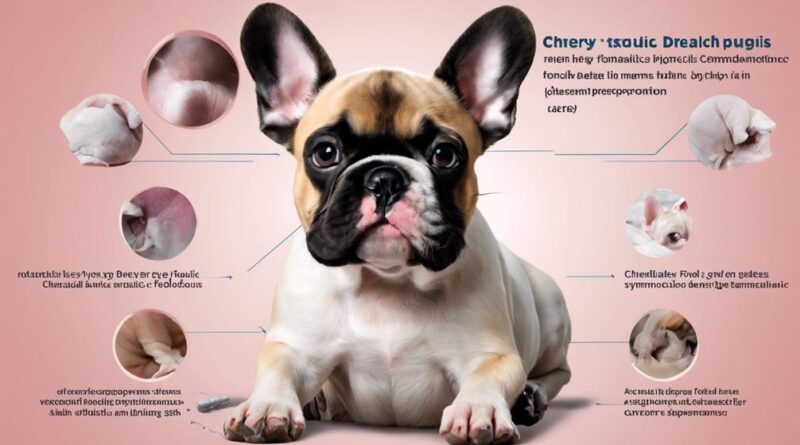Top 10 Common Diseases in French Bulldog Puppies
If you're considering a French Bulldog puppy, be aware of common diseases. Watch out for Brachycephalic Syndrome causing breathing issues. Keep an eye on Demodectic Mange leading to skin problems. Prevent Hip Dysplasia by maintaining weight. Check for Cherry Eye for timely treatment. Look for signs of Patellar Luxation for joint health. Keep allergies in mind, manage with proper care. Prevent Intervertebral Disc Disease with a healthy lifestyle. Be cautious of Congenital Heart Defects for proper care. Remember Parvovirus and get necessary vaccinations. Being informed helps in giving your Frenchie the best care.
Brachycephalic Syndrome
Brachycephalic Syndrome in French Bulldog puppies can lead to serious respiratory issues due to their characteristic short, flat faces. This syndrome is common in brachycephalic breeds like French Bulldogs due to their unique facial structure. The shortened skull shape often results in narrow nostrils, an elongated soft palate, and a smaller windpipe, leading to breathing difficulties.
French Bulldogs suffering from Brachycephalic Syndrome may exhibit symptoms such as noisy breathing, snorting, gagging, or even fainting. These signs can be distressing for both the puppy and the owner. It's crucial to address these issues promptly to ensure the well-being of the pup.
In severe cases where conservative management is unsuccessful, surgical options may be considered. Surgical interventions such as widening the nostrils (rhinoplasty) or shortening the soft palate can help alleviate the breathing difficulties caused by Brachycephalic Syndrome. These procedures aim to improve the airflow in the respiratory tract, making it easier for the puppy to breathe comfortably.
As a responsible French Bulldog owner, it's essential to be aware of the risks associated with Brachycephalic Syndrome and to seek veterinary advice if you notice any concerning symptoms in your furry companion. Early detection and appropriate management can significantly improve the quality of life for French Bulldogs affected by this syndrome.
Demodectic Mange
When dealing with French Bulldog puppies, Demodectic Mange can be a concerning skin condition that requires prompt attention from you as the owner. This condition, also known as Demodex or Red Mange, is caused by the Demodex canis mite and can lead to hair loss, redness, and skin irritation in affected puppies. French Bulldogs may be genetically predisposed to developing Demodectic Mange, but environmental factors such as stress or a weakened immune system can also play a role in its onset.
If you suspect your French Bulldog puppy has Demodectic Mange, it's crucial to consult with a veterinarian for proper diagnosis and treatment. Treatment options may include medicated shampoos, topical ointments, or oral medications to help eliminate the mites and manage the skin irritation. Additionally, your vet may recommend boosting your puppy's immune system through a balanced diet and supplements.
To prevent Demodectic Mange in French Bulldog puppies, maintaining good hygiene practices, reducing stress, and ensuring a healthy diet can help strengthen their immune system. Regular check-ups with your vet can also aid in early detection and management of any skin issues. By being proactive and attentive to your puppy's skincare needs, you can help keep Demodectic Mange at bay.
Hip Dysplasia
Dealing with health concerns in French Bulldog puppies, such as Demodectic Mange, highlights the importance of also being aware of potential issues like Hip Dysplasia. Hip Dysplasia is a common skeletal condition in which the hip joint doesn't develop properly, leading to malformation and degeneration over time. This condition can cause pain, lameness, and arthritis, significantly impacting your furry friend's quality of life.
Prevention is key when it comes to Hip Dysplasia. Maintaining a healthy weight and providing proper nutrition can help reduce the risk of developing this condition. Additionally, avoiding excessive high-impact activities during your puppy's growth phase can also aid in prevention.
If your French Bulldog is diagnosed with Hip Dysplasia, there are options available to help manage the condition. Surgical options like total hip replacement or femoral head ostectomy may be recommended in severe cases to improve your pup's mobility and alleviate discomfort. Rehabilitation programs, including physical therapy and exercise regimes, can also aid in your puppy's recovery and long-term care.
Cherry Eye
Cherry Eye in French Bulldog puppies is a common ocular condition that requires attention and proper management to ensure your furry companion's well-being. This condition occurs when the gland in the third eyelid becomes swollen and protrudes, causing a red or pink mass to protrude from the corner of the eye. While Cherry Eye isn't typically painful, it can lead to discomfort and potential complications if left untreated.
Surgical options are often recommended to address Cherry Eye in French Bulldog puppies. The surgical procedure involves repositioning the prolapsed gland and securing it back into place to prevent recurrence. It's essential to consult with a veterinarian experienced in ophthalmic surgeries to determine the most suitable approach for your pup. In some cases, alternative treatments such as topical medications may be considered, although they're generally less effective in the long term.
Prevention strategies for Cherry Eye in French Bulldogs mainly revolve around genetic predisposition. Since this condition is believed to have a hereditary component, it's crucial to obtain your puppy from a reputable breeder who prioritizes breeding healthy dogs. While Cherry Eye can't always be prevented, choosing a responsible breeder can reduce the likelihood of your French Bulldog developing this condition. Regular eye examinations by a veterinarian can also help detect any early signs of Cherry Eye, allowing for prompt intervention.
Patellar Luxation
Have you ever noticed your French Bulldog puppy experiencing intermittent hind leg lameness or skipping movements? These could be signs of patellar luxation, a condition where the kneecap dislocates from its normal position. Patellar luxation is a common issue in French Bulldogs and can range from mild to severe, causing discomfort and mobility issues in your furry friend.
Prevention and management are crucial when dealing with patellar luxation. Keeping your French Bulldog at a healthy weight can help reduce the risk of developing this condition. Regular exercise to strengthen the muscles around the knee joint is also beneficial. If your puppy is diagnosed with patellar luxation, your veterinarian may recommend conservative management with medication and physical therapy to help alleviate symptoms.
In more severe cases, surgical treatment may be necessary. Surgery aims to realign the kneecap and prevent further dislocations. After surgery, rehabilitation is key to ensuring a successful recovery for your French Bulldog. This may include controlled exercises, joint supplements, and follow-up appointments with the veterinarian.
Being proactive about your French Bulldog's joint health is essential in managing patellar luxation. By staying informed, working closely with your vet, and following their recommendations for prevention, management, and potential surgical intervention, you can help your puppy lead a happy and active life free from the discomforts of patellar luxation.
Von Willebrand's Disease
Von Willebrand's Disease, a hereditary bleeding disorder, is a condition that affects French Bulldog puppies, leading to potential complications in blood clotting. This disease results from a deficiency in von Willebrand factor, an essential protein for blood clotting. When this factor is impaired, it can lead to excessive bleeding even from minor injuries.
Genetic testing is crucial for identifying carriers of the disease. By conducting these tests, breeders can make informed decisions to prevent the spread of Von Willebrand's Disease within the French Bulldog population. If a puppy is diagnosed with this condition, various treatment options are available to manage the symptoms and improve their quality of life. These treatments may include medications to promote clotting or blood transfusions in severe cases.
In terms of management strategies, it's essential to avoid activities that may result in injuries leading to excessive bleeding. Regular visits to the veterinarian for check-ups and monitoring clotting profiles can help in early detection of any issues. When considering breeding, it's vital to ensure that both parents are tested for the disease to prevent passing it on to offspring.
Allergies

Experiencing common allergies can significantly impact the health and well-being of French Bulldog puppies. These adorable pups, just like humans, can be prone to various allergies that can cause discomfort and distress. Understanding the triggers and treatment options is crucial in managing their allergies effectively.
Here are three key points to consider:
- Food Sensitivities: French Bulldogs can develop allergies to certain ingredients in their diet, such as grains, dairy, or specific proteins. It's essential to monitor their food intake and consult with a veterinarian to identify and eliminate any potential allergens. Switching to hypoallergenic or limited ingredient diets may be necessary to alleviate food-related allergies.
- Environmental Triggers: Pollen, dust mites, mold, and other environmental factors can also trigger allergic reactions in French Bulldog puppies. Keeping their living area clean, using air purifiers, and minimizing outdoor exposure during high pollen seasons can help reduce the impact of these environmental allergens.
- Treatment Options and Prevention Strategies: Antihistamines, steroids, and topical treatments are commonly used to manage allergy symptoms in French Bulldogs. However, prevention is key. Regular grooming, maintaining a clean environment, and avoiding known allergens are vital in preventing allergic reactions in these sensitive pups.
Intervertebral Disc Disease
Intervertebral Disc Disease can cause significant discomfort and mobility issues in French Bulldog puppies, requiring prompt attention from veterinarians to ensure proper care and treatment. This condition affects the discs between the vertebrae of the spine, leading to pain, nerve damage, and even paralysis if left untreated. Prevention and early detection are crucial in managing this disease.
To prevent Intervertebral Disc Disease in French Bulldog puppies, it's essential to maintain a healthy weight to reduce strain on the spine. Avoid activities that put excessive stress on the back, such as jumping from heights. Regular exercise can help keep the muscles supporting the spine strong, decreasing the risk of disc damage.
If your French Bulldog puppy shows signs of Intervertebral Disc Disease, such as reluctance to move, yelping in pain, or an arched back, seek veterinary care immediately. Early detection can improve the prognosis and quality of life for your furry friend. Veterinarians may recommend conservative management with medication and rehabilitation exercises. In severe cases, surgical options like spinal decompression may be necessary to relieve pressure on the spinal cord.
Rehabilitation plays a crucial role in the recovery process post-surgery, helping your French Bulldog puppy regain mobility and strength. With proper care, attention, and treatment, many dogs can lead fulfilling lives even after being diagnosed with Intervertebral Disc Disease.
Congenital Heart Defects

Congenital heart defects can present significant challenges for French Bulldog puppies, necessitating early identification and specialized care to ensure their well-being. These conditions are present at birth and can affect the structure of the heart, leading to various symptoms that require prompt attention.
Here are some essential points to consider:
- Symptoms: Watch out for signs such as difficulty breathing, fatigue, fainting episodes, and a bluish tint to the gums and skin. If you notice any of these symptoms, it's crucial to seek veterinary care immediately for a proper diagnosis.
- Treatment: Treatment options for congenital heart defects may include medications to manage symptoms, surgical interventions to correct structural issues, or a combination of both. Your veterinarian will tailor the treatment plan to meet your puppy's specific needs and improve their quality of life.
- Prevention, Screening: While it's not always possible to prevent congenital heart defects, responsible breeding practices and genetic screening of parent dogs can help reduce the risk of passing on these conditions to offspring. Regular veterinary check-ups that include cardiac evaluations can also aid in early detection and management of heart defects in French Bulldog puppies.
Parvovirus
Parvovirus poses a serious threat to French Bulldog puppies, requiring proactive measures to safeguard their health and well-being. Prevention is key when it comes to parvovirus. Ensuring your puppy receives the necessary vaccinations on schedule is crucial in protecting them from this potentially deadly virus. Vaccination not only helps prevent the spread of the virus but also significantly reduces the severity of the disease if contracted.
If, despite preventive measures, your French Bulldog puppy does contract parvovirus, immediate treatment is essential. The survival rates for puppies treated for parvovirus greatly depend on how quickly the disease is diagnosed and treated. Symptoms of parvovirus include severe vomiting, bloody diarrhea, lethargy, and loss of appetite. If you notice any of these signs, it's vital to seek veterinary care promptly.
Treatment for parvovirus typically involves hospitalization, intravenous fluids to prevent dehydration, antibiotics to prevent secondary infections, and supportive care. The survival rates can vary, with early intervention significantly improving the chances of recovery. Your veterinarian will tailor the treatment plan to your puppy's specific needs, so follow their guidance diligently. With timely vaccination and swift action if infection occurs, you can help protect your French Bulldog puppy from the dangers of parvovirus.
Frequently Asked Questions
Can French Bulldog Puppies Outgrow Brachycephalic Syndrome?
Yes, French Bulldog puppies can outgrow some symptoms of Brachycephalic syndrome as they mature. Their growth potential may lead to slight improvements in respiratory challenges associated with Brachycephalic syndrome.
However, it's crucial to provide proper care, monitoring, and potentially surgical interventions if necessary to ensure their well-being. Regular vet check-ups and a conducive environment can support their development and help manage the effects of Brachycephalic syndrome effectively.
What Are the Early Signs of Hip Dysplasia in French Bulldog Puppies?
If your French Bulldog puppy shows early signs of hip dysplasia, such as bunny hopping or reluctance to move, early detection is crucial. Proper management through weight control, exercise moderation, and joint supplements can help.
In severe cases, surgical intervention may be necessary. Preventive measures like regular vet check-ups and avoiding excessive stress on the hips can aid in minimizing the impact of hip dysplasia on your furry friend's quality of life.
How Can Cherry Eye Be Prevented in French Bulldog Puppies?
To prevent cherry eye in your French Bulldog puppy, monitor their eyes regularly for any signs of swelling or irritation. Avoid putting pressure on the eye area, and be gentle when cleaning around it.
If cherry eye does occur, consult your veterinarian for preventative measures and potential surgical options. Early detection and proper care are key in managing this condition and ensuring your furry friend's eye health.
Are There Specific Allergy Triggers Common in French Bulldog Puppies?
When it comes to French Bulldog puppies, specific allergy triggers can vary. Food sensitivities and environmental triggers are common culprits.
To identify these triggers, allergy testing can be beneficial. If allergies are confirmed, treatment options like dietary changes, medication, or allergen avoidance can help manage symptoms effectively.
It's essential to work closely with your vet to develop a plan that suits your puppy's needs and ensures their well-being.
What Are the Warning Signs of Parvovirus in French Bulldog Puppies?
If your French Bulldog puppy shows symptoms like vomiting, diarrhea, lethargy, or loss of appetite, it could be parvovirus. Immediate vet attention is crucial for treatment.
Treatment typically involves supportive care like IV fluids and medications.
Prevent parvovirus by keeping your pup's vaccinations up to date, avoiding contact with infected dogs, and keeping your home clean.
Your vigilance is key to protecting your furry friend from this serious illness.
Conclusion
As a responsible French Bulldog owner, it's important to be aware of the common diseases that can affect your puppy. By staying informed and taking proactive steps to prevent and treat these conditions, you can help ensure a happy and healthy life for your furry companion.
Remember to consult with your veterinarian for guidance and support in keeping your French Bulldog in tip-top shape. Your puppy's well-being is worth the extra effort and attention.
